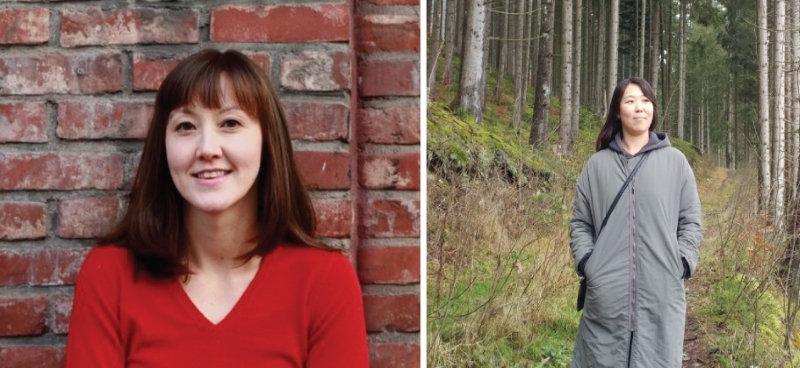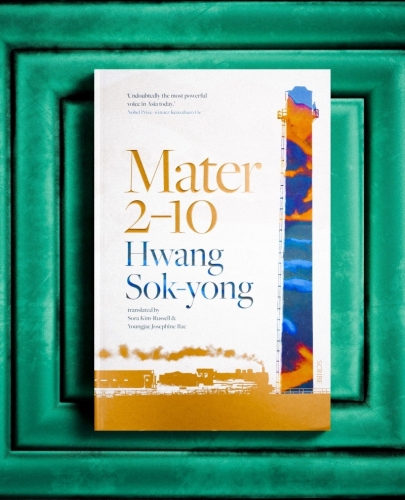- 한국어
- English
- 日本語
- 中文
- العربية
- Español
- Français
- Deutsch
- Pусский
- Tiếng Việt
- Indonesian
By Honorary Reporter Foteini Chatzoudi from Greece
Hwang Sok-yong's novel "Mater 2-10" is longlisted for this year's International Booker Prize as announced on April 9. The award recognizes the best in translated fiction, and the English-language edition was translated by the team of Sora Kim-Russell and Youngjae Josephine Bae
"Mater 2-10" is about three generations of a family of railroad workers and a laid-off factory worker organizing a high-altitude sit-in demonstration. It depicts the lives of working-class Koreans from the Japanese colonial era through national liberation and further in the 21st century.

Sora Kim-Russell (left) and Youngjae Josephine Bae (right). (Sora Kim Russell and Youngjae Josephine Bae)
Kim-Russell, a Korean American based in Seoul, is an acclaimed literary translator. Her translation of Pyun Hye-young's "The Hole" won the 2017 Shirley Jackson Award and that of "At Dusk" by Hwang was longlisted for the 2018 Man Booker International Prize.
She primarily translates works by Hwang and Pyun but has also covered those by novelists Kim Bo-young, Jeon Sungtae and Shin Kyung-sook.
Bae, another freelance translator residing in Seoul, received the 2019 Literature Translation Institute of Korea Award for Aspiring Translators and the 2021 Korea Times Modern Korean Literature Translation Award.
The following are excerpts from an email interview with both translators from May 14-19.
Why did you decide to pursue a career in translation?
Kim-Russell: I started as an aspiring writer and became fascinated with literary translation as a genre of writing. That, coupled with rent and the general need to make a living, inspired me to pursue a career in it.
Bae: After spending my childhood in the U.S., I developed a passion for English. My first college job was translating news articles. Post-graduation, I worked as an in-house translator before exploring other career paths, eventually returning to translation.
What are the challenges in translating Korean-language books into English?
Kim-Russell: The biggest one for me is always how to recreate the writer's voice in English, especially considering that most writers are not writing with translation in mind. The specificity of the audience also brings the challenges of puns, jokes and other forms of language play, jokes that only Korean readers would recognize or appreciate. Translating colloquial Korean into colloquial English without implicitly changing the setting is also challenging.

Hwang Sok-yong’s book "Mater 2-10" was translated into English by Sora Kim-Russell and Youngjae Josephine Bae. (Booker Prizes)
How did you two get assigned to translate Hwang Sok-yong's "Mater 2-10?"
Kim-Russell: I convinced Youngjae that she was ready for a solo project of this magnitude, but she shot me down. Then we talked about working on it together. If not for her, I might still be on maternity leave.
Bae: When Sora, expecting her second child, needed help translating "Mater 2-10," she approached me. Since I had no other commitments beyond my current non-fiction project, I agreed. Sora had already translated the first two chapters as a sample. I began from the third chapter and translated my part until she returned from maternity leave to complete the rest.
What impact did working on "Mater 2-10" have on you?
Kim-Russell: When I read the book, I was struck by its scope and significance, as well as Hwang's achievement in storytelling and folkloric prose. His endeavor to create a uniquely Korean narrative style has always impressed me. Translating this work into English challenged me to reconsider my approach and the essence of translation.
How did you preserve Hwang's voice and style given the linguistic differences?
Kim-Russell: When considering linguistic differences broadly, I remind myself not to fixate on the potential readership. While others have explored this topic extensively, it's crucial to recognize that a book's audience is diverse and imaginative beyond expectation.
Some readers will have no familiarity with the world of the book, others will feel right at home in it and others will understand it from a different but adjacent perspective. Letting go of worries or assumptions about imagined readers helps free you to take risks and find more ways to bring the author's voice and style to life in English.
Bae: For ''Mater 2-10'', dealing with titles for individuals was tricky because a person can be called by a number of titles, in addition to their name in Korean, depending on who you're speaking with. For instance, my name is Youngjae, but my younger sister calls me eonni (sister) and her husband calls me cheohyeong (sister-in-law) based on their respective relations with me. Such titles came up quite often in ''Mater 2-10,', so at one point, we had to decide how much we could preserve without compromising the translation's readability.
What aspects of translation do you enjoy most and why?
Bae: Translating is a chance to explore the English language and solve a puzzle by hunting for clues in the original text, dictionaries and a variety of other sources. It can be agonizing at times but rewarding when you find a combination of words that seem to work.
Kim-Russell: I often struggle with structure because the content and structure are provided for you, and your job is to play with words and focus on voice, intent and delivery. It's like solving a puzzle. Before starting the translation work, I'll often do a crossword or other word puzzle first to warm up and remind myself to have fun with it.
msjeon22@korea.kr
*This article is written by a Korea.net Honorary Reporter. Our group of Honorary Reporters are from all around the world, and they share with Korea.net their love and passion for all things Korean.